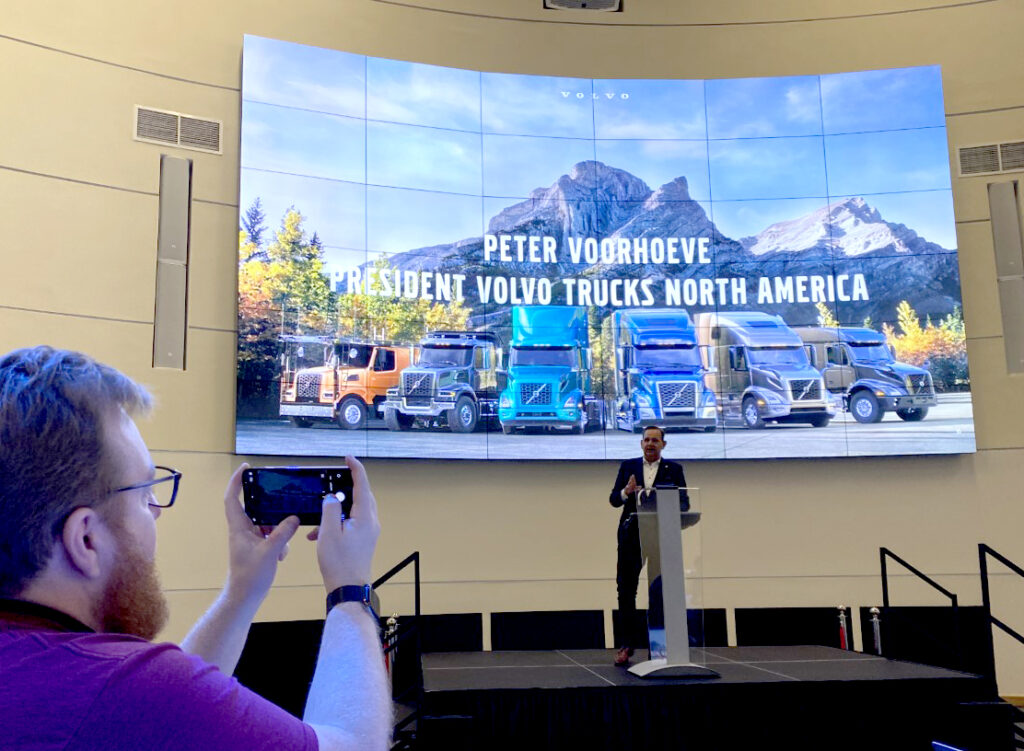Truck market to remain strong in 2023: Volvo president
Several economic indicators are pointing toward a recession, but Volvo Trucks North America believes demand for commercial vehicles will remain strong in the year to come – buoyed in part by fleets that need to update aging equipment.
Truck production has been dampened by several supply chain challenges, at first involving a shortage of semiconductors, but later spreading to other components and labor shortages.

“The red signs are everywhere. The stock exchange is going in the wrong direction. The interest rates are going up,” said Volvo Trucks North America president Peter Voorhoeve. GDP growth for the U.S. and Canada reached 5.4% in 2021, and in the wake of moves by the U.S. Federal Reserve it’s expected to grow 2% this year, and drop to 0.9% in 2023.
Interest rate hikes are needed to help ease labor and raw material shortages, he added. “This is what the Fed was invented for.”
While truck market activity has cooled from high levels, indicators such as freight loads, rates, and truckload carrier profitability remain strong, he said.
In the midst of it all, though, truck makers are balancing large backlogs for orders.
Supply chain challenges
This year Canada and the U.S. will see 275,000 new trucks, up from about 250,000 in 2021.
“What we see for the moment is a strong 2023,” Voorhoeve said, predicting a market at least as big as the one in 2022. “The transport industry will be less effected by whatever recession that we have.”
“Will demand meet supply or not? I don’t know.”
Many of those who are placing the orders need the trucks because they are behind on replacement cycles.
Volvo Trucks North America will work hard to offset supply chain challenges, he said, noting shortages of all-important semi-conductors are slowly coming under control.
“Right now, labor availability is a big issue,” he said. “It’s still difficult to fill shifts.”
Geopolitical challenges, though, are affecting the availability of lithium, Voorhoeve explained.
Growing market share
The OEM itself has made gains in market share in the face of several challenges. In 2019, when the market was strong, the share sat at 9.7%. During the early months of the Covid-19 pandemic, it inched up to 10%. Even with a strike at its New River Valley assembly plant in 2021, the share moved up to 10.4%.
This year, in the midst of a growing market, the share is 11.3% on a year to date basis.
“It’s small steps,” he said. But Voorhoeve stressed the gains are sustainable and not inflated by individual deals.
He offered the market update in a week where fleets and dealers from across North America had come to Virginia for the OEM’s electromobility sales summit – an event showcasing the VNR Electric truck, but also highlighting broader support including charging infrastructure, financing, and a consultative approach to supplying the vehicles.
Zero-emissions future
Looking ahead, Volvo is clearly focused on a zero-emissions future, pledging to slash carbon dioxide emissions in half by 2023 and altogether by 2040, when considered from a well to wheels basis.
“We’re not going to do that only with battery-electric vehicles,” he said, identifying a strategy that involves internal combustion engines, battery-electric vehicles, and hydrogen fuel cells. “Those three will live together.”
While the battery-electric vehicles have seen ranges grow from 150 to 275 miles, they’ll likely be focused on local and regional applications moving forward, he said. Fuel cells are the better fit for long hauls, and Volvo will be testing those in 2025. And in areas without charging support, renewable fuels fill the need.
“There’s a lot of research going on there,” he said.
Customers are doing research of their own. Quotations are no longer fixed on price alone, but are also asking questions about steps to support sustainability.
“We’re not selling trucks anymore. We’re working on decarbonizing transportation.”
Have your say
This is a moderated forum. Comments will no longer be published unless they are accompanied by a first and last name and a verifiable email address. (Today's Trucking will not publish or share the email address.) Profane language and content deemed to be libelous, racist, or threatening in nature will not be published under any circumstances.